The Compu-Crypto-Darwinist Case for Free Will
That time I challenged a determinist at a rationalist meetup
When rationalists have beers, or tea, or coffee, or esoteric vitamin concoctions, and start talking about rationalist things, and those things involve philosophy, there is a verifiable 38% chance the discussion devolves into an argument about Free Will. This shouldn’t be surprising, given how philosophers and theologians have argued for at least three thousand years about the topic with no clear resolution, and the argument could almost literally be applied to anything, from the nature of God to criminal justice reform. I have no strong feelings on the matter. I don’t think it matters whether I have free will or not as long as I think I do, so when this pops up in heavy discussions I basically troll whoever thinks they’ve got it figured out with the opposite position, and I cooked up a doozy last weekend at a West Side Atlanta bar so I figured I’d share it.
Laplace’s Demonic Infestation
Hard determinism goes like this. Your brain is a circuit, built partially from your inherited genetic code and partially from adjustments to it over time because of your environment. You were born with genes, which dictated some of the wiring, and your experiences adjusted the wiring over time. If your parents were narcissists, maybe you’re also a narcissist. If you ate lead paint chips or got dropped on your head as a baby, maybe your IQ goes down. At any given moment you are the combination of every experience you’ve ever had and every bit of genetic code you were handed at conception, so at any given moment your actions are predetermined, whether you realize it or not.
We may regard the present state of the universe as the effect of its past and the cause of its future. An intellect which at a certain moment would know all forces that set nature in motion, and all positions of all items of which nature is composed, if this intellect were also vast enough to submit these data to analysis, it would embrace in a single formula the movements of the greatest bodies of the universe and those of the tiniest atom; for such an intellect nothing would be uncertain and the future just like the past would be present before its eyes.
— Pierre Simon Laplace, A Philosophical Essay on Probabilities
Laplace becomes the John Calvin of the atheists, Michael Jordan was predestined to knock the Cavs out of the playoffs in 1989, and Osama Bin Laden’s attack on the Pentagon and the World Trade Center was just an inevitable combination of genetic and environmental factors in his brain, the brains of his followers, and the brains of the globalist neocons, set in motion by factors stemming all the way back to European colonization, the propagation of Abrahamic religions, and before.
Hard determinism is a rough position for most people to engage in, because most people really don’t like hearing that they are no more than robots, especially when the determinists reply “well of course you don’t think you’re a robot, that’s what a robot would think. I’m a robot too, and we’re having this conversation because of the inexorable tree of cause and effect.” It’s a surprisingly defensible position.
Rule 30 for Bulldozer Drivers
In 1983, computer scientist and physicist Stephen Wolfram introduced (or at least popularized) an elementary cellular automaton called “Rule 30.” I’m not a CS nerd, I only know enough Visual Basic to hack together spreadsheet scripts for construction site sediment pond design, but I’ll attempt to explain this to people more muggle than I.
Elementary cellular automations are a thing where you have a binary cell (0 or 1) that propagates generationally, and the states of the future cells are based on the cells that came before it according to simple rules. It’s like ghetto genetics for bits in an array. Wolfram basically invented these things as a way to think about stuff, developed different rule sets for their propagation, and then discovered neat ways to use them. Rule 110 for instance can be used to simulate any possible computer program because it’s Turing Complete. We’re going to focus on Rule 30 instead.
You can do Rule 30 yourself with a pen and paper. If the cell is black (a 1) and it’s neighbors are both also black (1) the cell turns white (0). If the cell is black, its left neighbor is black, and its right neighbor is white, it turns white. If a cell is white, its left neighbor is black, and its right neighbor is white, it turns black. And so forth, following the rules in this table:
It’s called “Rule 30” because in binary 00011110 = 30. Do this on a sheet of graph paper starting with a single black box and you get the first image above. Do it on a giant sheet of graph paper and you get the second image. The pattern is fundamental to chaos theory, produces results so seemingly random that Mathematica actually has it as an option for pseudorandom number generation, and has implications all over the place from crypto to number theory. The most fun implication, I think, is to evolution itself.
EVOLVE!
When I was a kid before the internet, my friends and I spent a hell of a lot of time on dial up bulletin board systems, sending messages to randos and downloading freeware games over 2400 baud external modems. I still have warm feelings when I hear the modem handshake, indicating I’d finally broken through the busy signal to get onto some other dude’s computer from a phone number printout pinned to my wall I downloaded from OASis, the Online Atlanta Society hub.
One of the games I downloaded was called Evolve!, and it worked on a curiously similar framework to Rule 30. You can download it here, or play in a browser window.
DOSGames.com Review: *** Rating: 3
Evolve! Lite (the "Lite" indicating the shareware version) is a life simulation game / simulator where two different life forms vie for supremacy. Rather than controlling the life forms directly, you change the environmental conditions and the creatures' behavior. The latter is controlled via a 3x3 grid of different actions the creature takes in different situations.
This is the gameplay:
You begin by hard coding a “genome” into two species, which are then propagated across a field with a certain spawn rate for little green dots which are plants. A species of pixel who ends up next to a plant eats it and gains energy, potentially spawning a new copy of itself. A species who gangs up against the other species can also eat it, gaining energy, and potentially spawning a new copy. You and a friend cook up two different behavioral genomes and hit ‘go’ and see which of the species wins by outcompeting the other. Here’s a snapshot of one of the organisms after a bit of runtime:
This little creature “continues to do what it was doing before” in most environmental circumstances, but it does a U turn when it has 2 friends and no foes, and it goes a random direction when it has 2 friends and 1 foe. It didn’t start this way, this behavioral code is a product of several generations with a 10% behavioral code mutation rate. This game is really fun. Go play it. You learn two important things playing this game:
Species which have some (but not a lot of) randomness in their behavioral code outcompete ones that don’t,
Species which have some (but not a lot of) genetic randomness built into how they transmit their behavioral code evolve to outcompete ones that don’t.
Item 2 is foundational to Darwinist thought, but item 1 is just as important.
The Indeterminate Robot
The Hard Determinists claim we are all robots. Okay. Let’s walk that through. My son (10) and daughter (8) attended a week long robot camp this summer. They used VEX Robotics kits to gather ping pong balls and throw them into buckets. Each team made a different robot, most of which looked something like this:
Part of the parent demonstration towards the end of the week showed how they could program the robots to collect ping pong balls automatically using visual sensors. But that relates curiously to Evolve!, in which we program little bits to move around a computer screen and eat plants and each other, which in turn relates to Rule 30.
If we have a simple arena where robots collect balls and throw them into baskets, a robust and complicated enough determinate behavioral program beats an indeterminate behavioral program. But as the complexity of the ping pong ball arena increases, the arena will exceed the capacity for a programmer to account for all possible arrangements of the arena, and an indeterminate program is the only possible way to explore the entire arena space and collect the most ping pong balls. The indeterminate program outcompetes the determinate program.
If we presume that Chaos Theory is indeed a thing, and that Rule 30 qualifies as a way where simple behavioral programing becomes indeterminate, we must conclude that (real) cells, by which I mean early Earth life, could also have indeterminate programming.
If we presume that some amount of indeterminate programing is evolutionary advantageous in a large enough environmental space, then we must conclude that the early Earth life which took advantage of indeterminism outcompeted early Earth life which was wholly deterministic.
If we presume that humans are a product of the same evolutionary pressures and descended from early indeterministic Earth life, then we too must have some amount of indeterminate programing.
And if we define “Free Will” as “behavior which is not deterministic,” then we must conclude that we have free will, provided Darwinism holds.
QED
As I mentioned at the beginning, I don’t really care that much about the Free Will argument, but I figured this was a fun enough argument in favor to share.




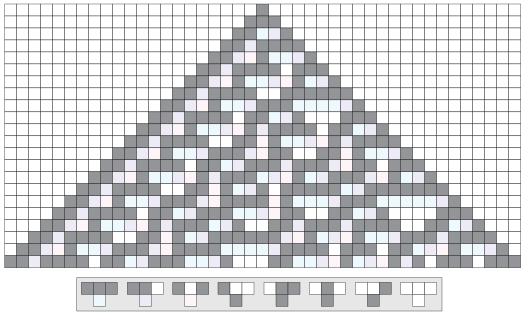
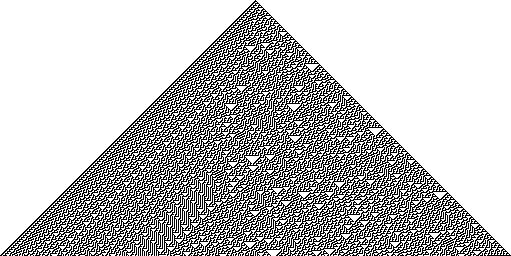


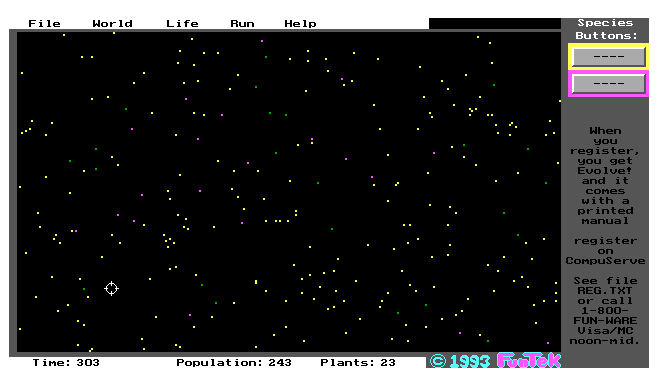
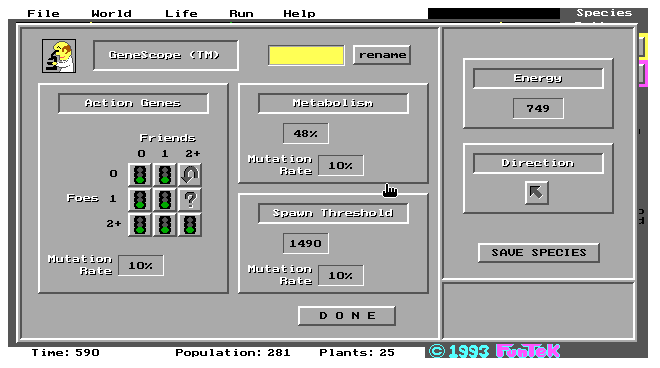
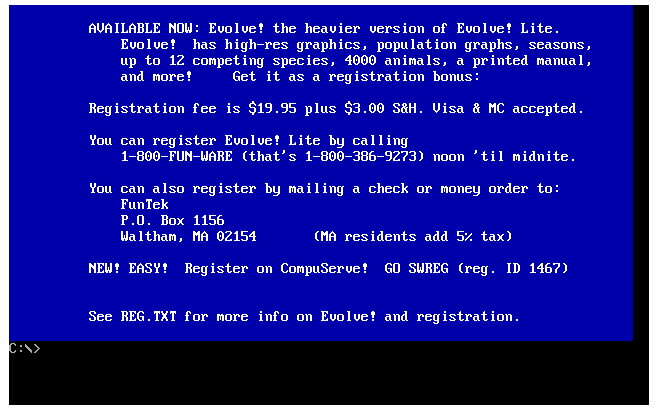

FTA "If we presume that Chaos Theory is indeed a thing, and that Rule 30 qualifies as a way where simple behavioral programing becomes indeterminate, we must conclude that (real) cells, by which I mean early Earth life, could also have indeterminate programming."
Chaos Theory is inherently deterministic, as is Rule 30. Indeterminate behaviour does not mean something is inherently non-deterministic, it means it's not explicitly prescribed a priori. Even the use of random numbers does not make the behaviour inherently nondeterministic because computers don't use truly random numbers (if truly random number generation is even possible). Random number generators use a seed to generate the "random" value based on a deterministic process/algorithm.
FTA "And if we define “Free Will” as “behavior which is not deterministic,” then we must conclude that we have free will, provided Darwinism holds"
Not to mention both uses of "we must conclude" are not necessarily true. Darwinian evolution has to do with deterministic (but so complex that to us humans it seems random) processes of random mutation and natural selection. And even if true randomness was possible then you're left with a system that's part deterministic and part truly random, I still fail to see where there's any room for "Free Will" in that process. So "If we define free will as non-deterministic behavior" means just random behavior then there doesn't seem like there's much freedom or will left in that definition of "free will".
Engineers are just better at this because of FAPP. FAPP, free will exists and I have it. Done.